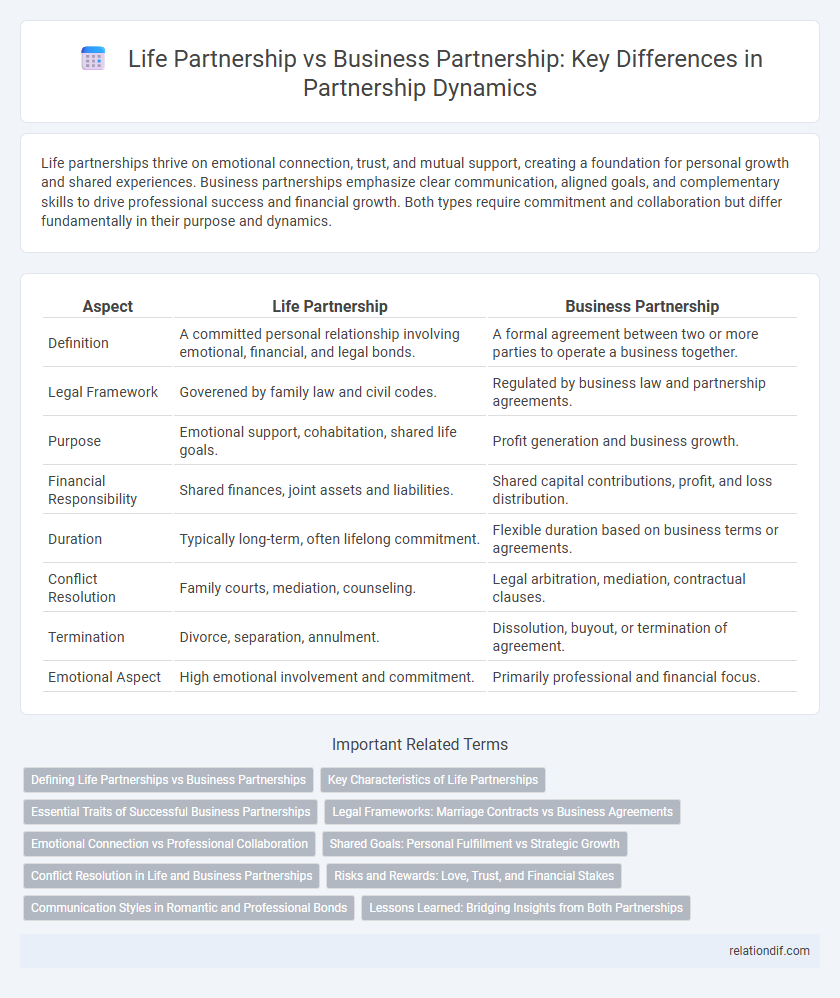Life partnerships thrive on emotional connection, trust, and mutual support, creating a foundation for personal growth and shared experiences. Business partnerships emphasize clear communication, aligned goals, and complementary skills to drive professional success and financial growth. Both types require commitment and collaboration but differ fundamentally in their purpose and dynamics.
Table of Comparison
| Aspect | Life Partnership | Business Partnership |
|---|---|---|
| Definition | A committed personal relationship involving emotional, financial, and legal bonds. | A formal agreement between two or more parties to operate a business together. |
| Legal Framework | Goverened by family law and civil codes. | Regulated by business law and partnership agreements. |
| Purpose | Emotional support, cohabitation, shared life goals. | Profit generation and business growth. |
| Financial Responsibility | Shared finances, joint assets and liabilities. | Shared capital contributions, profit, and loss distribution. |
| Duration | Typically long-term, often lifelong commitment. | Flexible duration based on business terms or agreements. |
| Conflict Resolution | Family courts, mediation, counseling. | Legal arbitration, mediation, contractual clauses. |
| Termination | Divorce, separation, annulment. | Dissolution, buyout, or termination of agreement. |
| Emotional Aspect | High emotional involvement and commitment. | Primarily professional and financial focus. |
Defining Life Partnerships vs Business Partnerships
Life partnerships involve emotional commitment, mutual support, and shared personal goals between individuals, emphasizing trust and intimacy. Business partnerships prioritize collaboration, resource sharing, and profit generation, governed by legal agreements and defined roles. While life partnerships focus on personal growth and companionship, business partnerships center on strategic objectives and operational efficiency.
Key Characteristics of Life Partnerships
Life partnerships center on emotional support, mutual trust, and long-term commitment, contrasting with business partnerships that prioritize financial goals and operational roles. Key characteristics include shared values, effective communication, and joint decision-making that foster personal growth and stability. These elements build a foundation of intimacy and resilience essential for navigating life's challenges together.
Essential Traits of Successful Business Partnerships
Successful business partnerships rely on clear communication, mutual trust, and aligned goals to drive growth and innovation. Unlike life partnerships that emphasize emotional support, business partnerships focus on complementary skills, shared vision, and accountability for results. Effective collaboration and decision-making frameworks are essential to navigate challenges and sustain long-term profitability in business environments.
Legal Frameworks: Marriage Contracts vs Business Agreements
Life partnerships are governed by marriage contracts that establish rights and obligations related to property, inheritance, and spousal support under family law. Business partnerships rely on legally binding business agreements that define ownership shares, profit distribution, and dispute resolution mechanisms within corporate or commercial law. Understanding these distinct legal frameworks is essential for protecting interests and ensuring compliance in both types of partnerships.
Emotional Connection vs Professional Collaboration
Life partnership centers on an emotional connection, trust, and mutual support that fosters personal growth and shared experiences. Business partnership emphasizes professional collaboration, strategic decision-making, and aligned goals to drive organizational success and financial growth. Understanding the distinct dynamics of emotional bonding versus goal-oriented teamwork is crucial for nurturing both life and business partnerships effectively.
Shared Goals: Personal Fulfillment vs Strategic Growth
Life partnerships prioritize shared goals centered on personal fulfillment, emotional support, and mutual growth in values and experiences. Business partnerships focus on strategic growth, aligning goals such as market expansion, profitability, and competitive advantage. Understanding the distinct objectives in each partnership type ensures clarity in commitment and success in collaborative efforts.
Conflict Resolution in Life and Business Partnerships
Conflict resolution in life partnerships requires emotional intelligence and empathy to address personal differences and strengthen trust, while business partnerships prioritize strategic negotiation and clear communication to resolve disputes efficiently and protect shared interests. Life partnerships often rely on ongoing dialogue and compromise to maintain harmony, whereas business partnerships implement formal mechanisms such as mediation or arbitration to ensure objective and timely solutions. Recognizing these distinct approaches enhances conflict management and supports long-term stability in both relational and professional domains.
Risks and Rewards: Love, Trust, and Financial Stakes
Life partnerships thrive on emotional trust and mutual support, creating deep personal bonds that can enhance resilience during challenges. Business partnerships involve financial stakes and legal obligations, requiring transparency and strategic alignment to mitigate risks and maximize profits. Both types demand commitment and clear communication to balance trust with accountability, essential for sustaining long-term success.
Communication Styles in Romantic and Professional Bonds
Effective communication styles differ significantly between life partnerships and business partnerships, with emotional expression and empathy being paramount in romantic bonds, while clarity and assertiveness dominate professional interactions. In life partnerships, nonverbal cues and active listening foster intimacy and trust, whereas business partnerships emphasize structured dialogue and goal-oriented discussions to maintain productivity. Understanding these nuanced communication dynamics enhances relationship satisfaction and collaboration success across both personal and professional domains.
Lessons Learned: Bridging Insights from Both Partnerships
Life partnerships emphasize emotional resilience, trust, and effective communication as key pillars for long-term success, while business partnerships prioritize strategic alignment, financial transparency, and goal-oriented collaboration. Lessons learned from both suggest that integrating empathy with clear contractual agreements enhances mutual understanding and conflict resolution. Bridging insights between these partnerships highlights the importance of balancing personal values with professional objectives to foster durable and productive relationships.
life partnership vs business partnership Infographic

 relationdif.com
relationdif.com